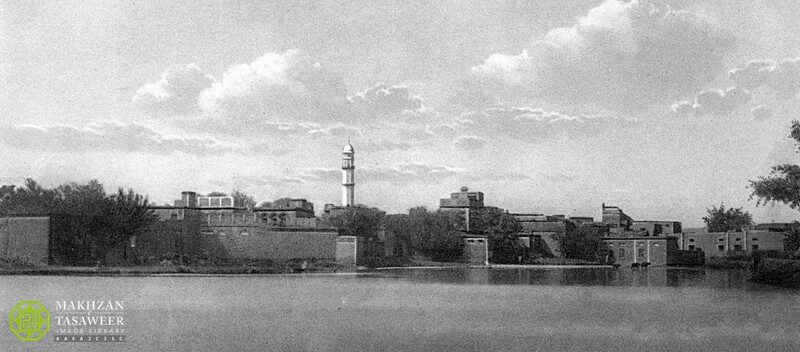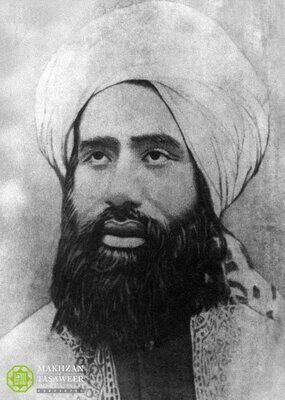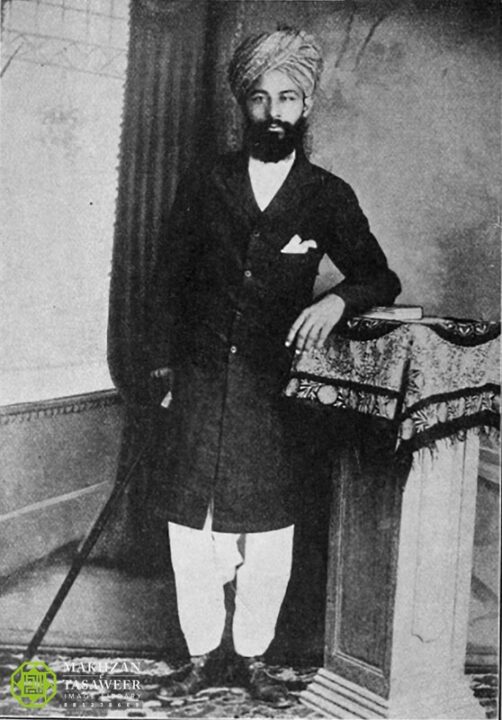Romaan Basit, Jamia Ahmadiyya UK

History has it that on many occasions, the Jamaat was told by its opponents that it would perish “very soon” – “it is only a matter of time”, they said.
This threat has reverberated for over a century, but all to no avail. The result we have always witnessed is the failure of the conspirers. On the other hand, the progress of the Jamaat has always reached new heights.
Whenever such a trial is faced by the Jamaat, it causes a great deal of alarm and shock for many.
Is this the downfall of the Jamaat? Is this the beginning of the end?
The answer to both questions is a resounding “no”. But how can we be so sure? Well, it takes a quick stroll through history to see how such threats emerged, unfolded and were wrapped up.
Not only this, but we actually notice similar trends and patterns in which such conspiracies against the Ahmadiyya Jamaat move.
Alluding to this, Hazrat Khalifatul Masih Vaa recently said:
“Some from among the younger generation become worried too quickly. Those […] who have studied even a bit of history do not feel anxious in such conditions.” (Al Hakam, 4 February 2022, www.alhakam.org/reporting-the-insightful-words-of-huzoor/)
To enhance my own knowledge of history and gain a better understanding of such conspiracies, I decided to look into the details of how the children of none else but Hazrat Hakim Maulvi Nuruddin, Khalifatul Masih Ira became prey to the schemes of Satan. Regarding these unfortunate individuals, Hazrat Khalifatul Masih IIra stated in 1956:
“In our time, Satan has chosen the sons of Hazrat Khalifatul Masih Ira, in the same way [Satan] chose the tree of life during the time of Adam.” (Khilafat-e-Haqqa Islamia, Anwar-ul-Ulum, Vol. 26, p. 32)
It is deeply unfortunate that the children of a Khalifa chose to side with the opponents of the Ahmadiyya Muslim Jamaat. In this short piece, I will rely mainly on the words of Hazrat Khalifatul Masih IIra to narrate this series of events.
A campaign to undermine Khilafat
It all started in 1914 when a section of the Jamaat decided not to follow Khilafat as the leadership of the Jamaat. Instead, they believed that Sadr Anjuman should manage its affairs. This school of thought broke away from the mainstream Jamaat and made their own little community by the name of Ahmadiyya Anjuman-e-Ishaat-e-Islam Lahore. They will be referred to as “Lahoris” as this is the name they are commonly known by.
Since things did not follow their aspirations, and a vast majority sided with the Khilafat of Hazrat Mirza Bashiruddin Mahmud Ahmadra, the plans and desires of the Lahoris were dampened. From here started a bitter campaign where the Lahoris would go to any limit to undermine the institution of Khilafat.
A debate hogged the literature of the Jamaat and that of the Lahoris, where a literary war continued for several months.
Having faced defeat there, the next move of the Lahoris was to create unrest and discord among those who had done bai‘at of Hazrat Khalifatul Masih IIra. This, they thought, was only possible through creating a contestant of Khilafat from within the Jamaat.
Shrewd as they were, they knew the easiest way to get such a contestant would be from a noble and respected family; and who could be more honourable than Hazrat Khalifatul Masih Ira.

An important aspect to keep in mind is the identification of a pattern such conspiracies usually take. In their attempt to bring down the Jamaat, the Lahoris knew they would have to attack the institution of Khilafat first.
Seeds of jealousy are sown
The opponents of the Ahmadiyya Jamaat incited the sons of Hazrat Khalifatul Masih Ira to claim to be “the rightful heirs” of Khilafat, as their father had been the Khalifa. This is how the seeds of doubt were first planted, slowly but steadily.
After the demise of Hazrat Khalifatul Masih Ira, the opponents visited his wife and told her, “If Abdul Haye [Hazrat Khalifatul Masih I’s eldest son] had become the Khalifa, they would have pledged allegiance at his hand.” (Anwar-ul-Ulum, Vol. 26, p. 71)
Clearly, this was all mischief, as the Lahoris had always been against the system of Khilafat altogether. It was only a plot to rouse their family against the Khalifa of the time. Although Abdul Haye Sahib remained faithful to Khilafat, his brothers – Abdul Salam Umar Sahib, Abdul Wahab Umar Sahib and Abdul Mannan Umar Sahib – all fell prey to the opponents.
They were made to believe that their right to Khilafat had been snatched by Hazrat Mirza Bashiruddin Mahmood Ahmadra, the son of the Promised Messiahas. Hazrat Khalifatul Masih IIra was to later put it as such:
“Allah the Almighty saved Abdul Haye from being involved in this conspiracy; however, the rest of the sons of the First Khalifa entertained the following thought: ‘Khilafat is our right and we should take it back. This thought continued to rattle in their hearts.’” (Anwar-ul-Ulum, Vol. 26, p. 74)
This mischief became so deep-rooted in their hearts that they would go around telling innocent Ahmadis, “Remember that Qadian became inhabited because of Hazrat Khalifatul Masih I […] Qadian will now cease to exist.” (Tarikh-e-Ahmadiyyat, Vol. 18, p. 12)
Greater unrest can be sparked from within
As they stooped lower, their mischief soared higher. These unfortunate sons of a fortunate person, taking advantage of their lineage and the love that Ahmadis had for them, started to sow seeds of mistrust, doubt and evil innovations.
They wanted to incite a rebellion against Khilafat, yet continue to claim they were in the Khalifa’s bai‘at. A statement from Abdul Wahab Umar Sahib attests to this attempt:
“There should not be a dars [a religious sermon] of Tafsir-e-Kabir, as it is the opinion of an individual. The Khalifa can make a mistake; hence it is permissible to disagree with the Khalifa on fundamental issues. Also, it is permissible to remain in the bai‘at whilst upholding your differences with the Khalifa.” (Tarikh-e-Ahmadiyyat, Vol. 18, p. 17)
This, again, points to a pattern: Insist on remaining in the Jamaat so that unrest can manifest at a greater level within.
Once, Hazrat Khalifatul Masih I’sra family, who opposed Khilafat and lived in Qadian, came to meet Hazrat Khalifatul Masih IIra. The wife of the First Khalifa explained how her family did not feel valued anymore and expressed her expectation that the Lahoris might value the worth of their lineage. She explained how the Lahoris had been showering them with gifts, money and other privileges.
Hazrat Khalifatul Masih IIra said the Jamaat respected the family of Hazrat Khalifatul Masih Ira, but Khilafat was not based on lineage, and if they desired to join the Lahoris and leave Qadian, they could. He said:
“You can leave if that pleases you and vents your anger […]”.
The conviction behind these words made them remain in Qadian and not leave for Lahore. (Anwar-ul-Ulum, Vol. 26, p. 75)
This incident proved to be helpful for the Jamaat, as it made it clear that hypocrites were present and operating close to the institution of Khilafat, in Qadian. It was now more important than ever to remain vigilant. Suddenly, matters took a turn for the unexpected.
By any means necessary – a plot to poison
Until now, the ploys of the opponents and hypocrites were limited to mere thoughts and words. Their frustration brewed and eventually led them to a new objective: The Khalifa must be taken out by any means necessary – even if that meant putting an end to his life.
In 1918, a plot was hatched to poison Hazrat Khalifatul Masih IIra.
Where was this to be carried out? Unfortunately, in the very house of Hazrat Khalifatul Masih Ira – the very man who held Hazrat Mirza Bashiruddin Mahmud Ahmadra in high esteem, and loved him more than his own children.

Shocking as it is, the following testimony shows the gravity of the situation:
“Some opponents from Lahore hatched a plan to poison Huzoor in the following way: A dinner was to be held at the house of Amma Ji [the wife of Hazrat Khalifatul Masih Ira], but all arrangements of food were to be secretly made by the Lahoris. This plot, however, was exposed by someone who had overheard the secret planning.” (Anwar-ul-Ulum, Vol. 26, p. 75)
Since this plot was foiled by Allah’s help, it only fuelled the evil intentions of the conspirers and their accomplices.
Blackmail and false propaganda
At around the same time, an attempt was made to blackmail Hazrat Khalifatul Masih IIra. Abdus Salam Umar Sahib mentioned in a gathering that he was in possession of Huzoor’s personal letters, which were, God forbid, full of obscene and vulgar content. They threatened to have them published and thus “expose” Huzoorra to the whole Jamaat.
When Huzoorra came to learn of this, he replied:
“If there is an ounce of integrity left in this family, they should publish these letters; otherwise, may the curse of Allah be upon the liars.” (Anwar-ul-Ulum, Vol. 26, p. 76)
The pattern here needs no explanation. Opponents threatening to blackmail the Jamaat is usually the next move.
The slander and attempted defamation of Huzoorra continued to escalate. In 1926, Abdul Wahab Umar Sahib accused Huzoorra of a grave criminal offence – killing his brother Abdul Haye Sahib. To this, Huzoorra said:
“Mian Abdul Wahab Sahib accused me of poisoning the deceased Abdul Haye, and also of living a lavish and luxurious life.” (Anwar-ul-Ulum, Vol. 26, p. 77)
In 1929, the opponents met Abdul Wahab Umar Sahib, Abdul Mannan Umar Sahib and Abdus Salam Umar Sahib and a plot was hatched to spread false allegations against Hazrat Khalifatul Masih IIra. This is another element of the pattern that every conspiracy follows.
In 1930, Abdul Mannan Umar Sahib spread the idea that the Jamaat was trying to get rid of his family, so that the name of Hazrat Maulvi Hakim Nurudinra could be erased from the history of the Jamaat.
Other vile acts that Hazrat Khalifatul Masih IIra was accused of, on various occasions, are such that no civil person can repeat or bear to listen to them.
The opponents did not care and threw any and every accusation at Khilafat. Huzoorra was even accused of attempting to place Hazrat Mirza Nasir Ahmadrh as the “heir to the throne” – the very selection of the words they used shows how they understood Khilafat. Opponents claimed that the Jamaat had already started propaganda to install him as the next Khalifa.
Hazrat Nawab Mubaraka Begumra once said to Hazrat Khalifatul Masih IIra:
“They say such hurtful things about you that it is difficult to even listen to them. Why don’t you do something about them?” (Tarikh-e-Ahmadiyyat, Vol. 18)
Huzoorra replied by saying that he had such deep love for Hazrat Khalifatul Masih Ira that he found it hard to even expose the dreadful ways his children had fallen for.
We must remember here that Abdul Mannan Umar Sahib was given many responsibilities to serve the Jamaat. He remained the afsar (officer) of Jalsa Salana for several years and was given other important roles. But when desire is the primary motive, nothing ever seems sufficient.
Illness of Hazrat Khalifatul Masih IIra
This conspiracy was unique in the sense that it continued for decades. It would have remissions and it flared up from time to time. The children of Hazrat Khalifatul Masih Ira remained favourites of the opponents, especially the Lahoris, to be used as and when they wanted to create unrest in the Jamaat.
Then came a time in 1953, when an attempt was made on the life of Hazrat Khalifatul Masih IIra. He was stabbed in the neck by an assailant. Although Huzoorra survived the attack, the injury left a long-term negative impact on Huzoor’s health. The mischievous group saw this as a golden opportunity to try their luck once again. This time, Abdul Mannan Umar Sahib was chosen in particular.
To seek further medical advice, Hazrat Khalifatul Masih IIra had to travel to Europe in 1955. While Huzoorra was away from the markaz (headquarters of the Jamaat) Abdul Mannan Umar Sahib and his associates lodged propaganda about Huzoor’s ill health and old age.
They struck in the guise of sympathisers of the Jamaat, who simply wanted “a healthier” and more “functional” Khalifa. Using this trick, they tried to turn people away from Huzoorra by painting him as a “frail, defunct Khalifa”, who needed to be replaced by a more “educated and healthier person” – the virtues that the unfortunate Abdul Mannan Umar Sahib attributed to himself.
This, again, is a strange parallel in every such attempt in history.
Abdul Wahab Sahib, promoting his brother in the name of their lineage, would visit Ahmadis and try to create doubts. One such Ahmadi recalled how Abdul Wahab Sahib said to him, “Have you seen how much money is being spent? […] The Khalifa has now lost his mind and is not fit enough to remain the Khalifa.” (Anwar-ul-Ulum, Vol. 26, p. 116)
“He is too old now. Somebody else should be elected to replace him.” (Tarikh-e-Ahmadiyyat, Vol. 18, p. 14)
Compassion of Hazrat Khalifatul Masih and the ill-fate of the mischief-makers
Hazrat Khalifatul Masih IIra, out of the immense love that he had for Hazrat Khalifatul Masih Ira, remained silent and never took any disciplinary action against his family for many decades. It was not until it became essential for the greater interest of the Jamaat that he took action. Huzoorra would try to explain to them that Hazrat Khalifatul Masih Ira always took pride in being at the service of the Promised Messiahas. He never desired any high position for himself and had acquired the respect of the Jamaat only through remaining as a servant of the Promised Messiahas.
Huzoorra explained that the lofty status of Hazrat Khalifatul Masih Ira was granted to him out of his sheer love and servitude for the Promised Messiahas, and that Khilafat is a responsibility given by Allah the Almighty to whosoever He chose; it is not a position acquired through deceitful, human means.
He tried to make them understand that age, knowledge, wealth and lineage did not matter when it came to Allah’s choice.
But despite all this compassion, they continued to play in the hands of the opponents, falling prey to their conspiracies and always choosing to join hands with them in their evil schemes.
Eventually, they ended up being disconnected from the Jamaat of the Promised Messiahas and from the Jamaat that their father had so dearly loved all his life.
Conclusion
It is a sad and unfortunate story, but a real eyeopener. We realise that lineage, however noble it may be, is not a guarantor of faith.
Hazrat Khalifatul Masih Vaa, speaking on the martyrdom of Syed Taalay Ahmed Shaheed, said in his Friday Sermon of 3 September 2021:
“The honour of the family [of the Promised Messiahas] or being physically related to them does not give a person status. If anyone respects them […] it is due to them being servants of the faith and giving precedence to their religion over worldly matters.
“To be the son or daughter of a revered person is not a source of pride if your actions do not make you worthy of that honour.
“[Taalay] was a diamond that has now departed from us. May Allah the Almighty continue to grant the Jamaat such people who are loyal, have a sincere and dedicated relationship with Khilafat, and give precedence to their faith over worldly matters.”
May Allah enable us to become loyal, sincere and dedicated servants and may He always keep us firm on the right path:
رَبَّنَا لَا تُزِغۡ قُلُوۡبَنَا بَعۡدَ اِذۡ ہَدَیۡتَنَا وَہَبۡ لَنَا مِنۡ لَّدُنۡکَ رَحۡمَۃً ۚ اِنَّکَ اَنۡتَ الۡوَہَّابُ
“Our Lord, let not our hearts become perverse after Thou hast guided us; and bestow on us mercy from Thyself; surely, Thou alone art the Bestower.” (Surah Al-e-Imran, Ch.3: V.9)
(Abdus Salam Umar Sahib later attached himself to Khilafat-e-Ahmadiyya and is buried in Bahishti Maqbara, Rabwah. Through a grandson of Hazrat Khalifatul Masih Ira, Abdul Wasay Umar Sahib (son of Abdus Salam Umar Sahib), some sections of Hazrat Khalifatul Masih I’sra family were connected to Khilafat-e-Ahmadiyya again and remain so to this day. While pride in one’s lineage can become a test for some, the majority of such people have remained loyal to Khilafat-e-Ahmadiyya and still do to this day. The one or two examples of where it was misunderstood was only by individuals; meanwhile, their families stood steadfast with Khilafat.)


JazakAllah .
An eye opener article.